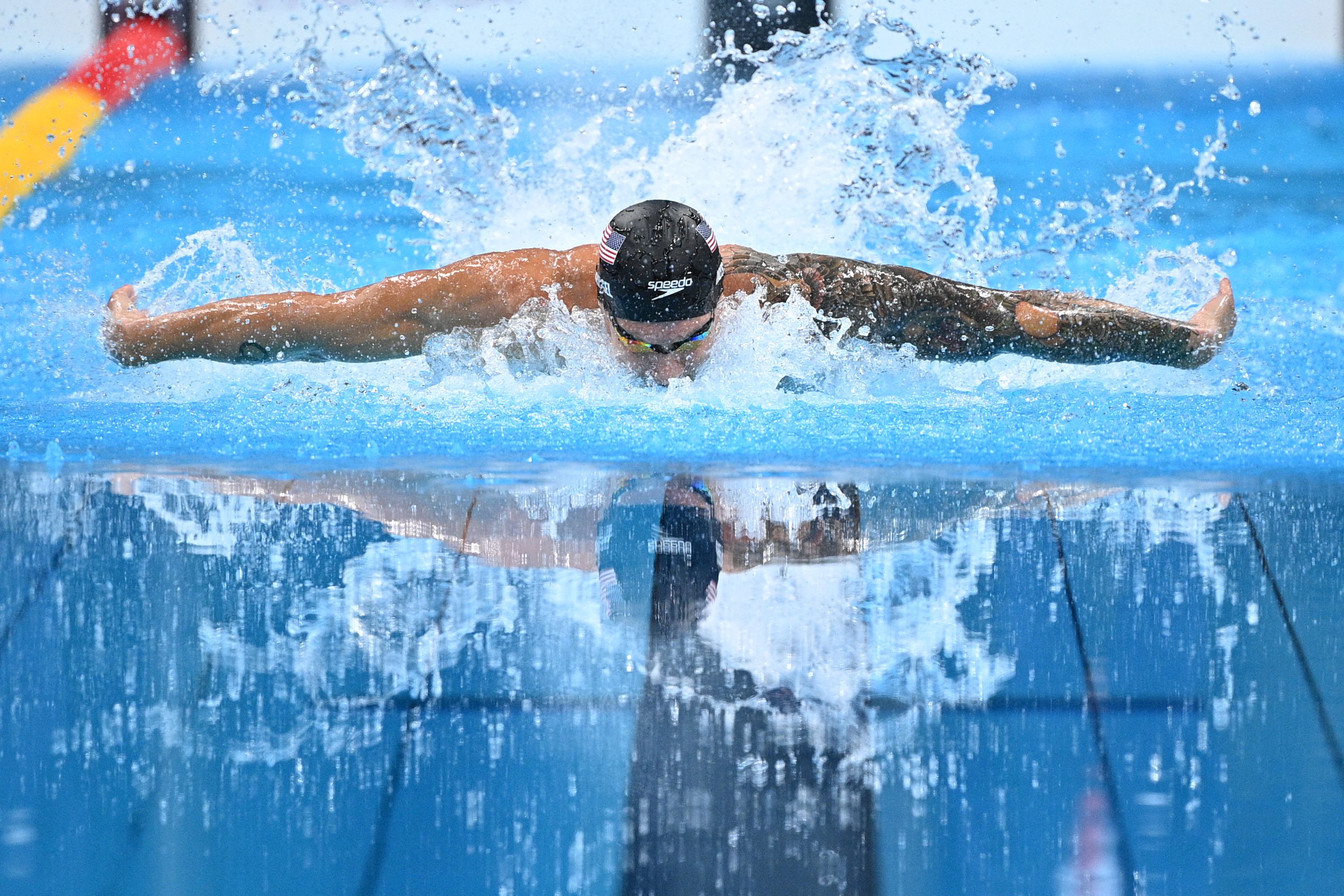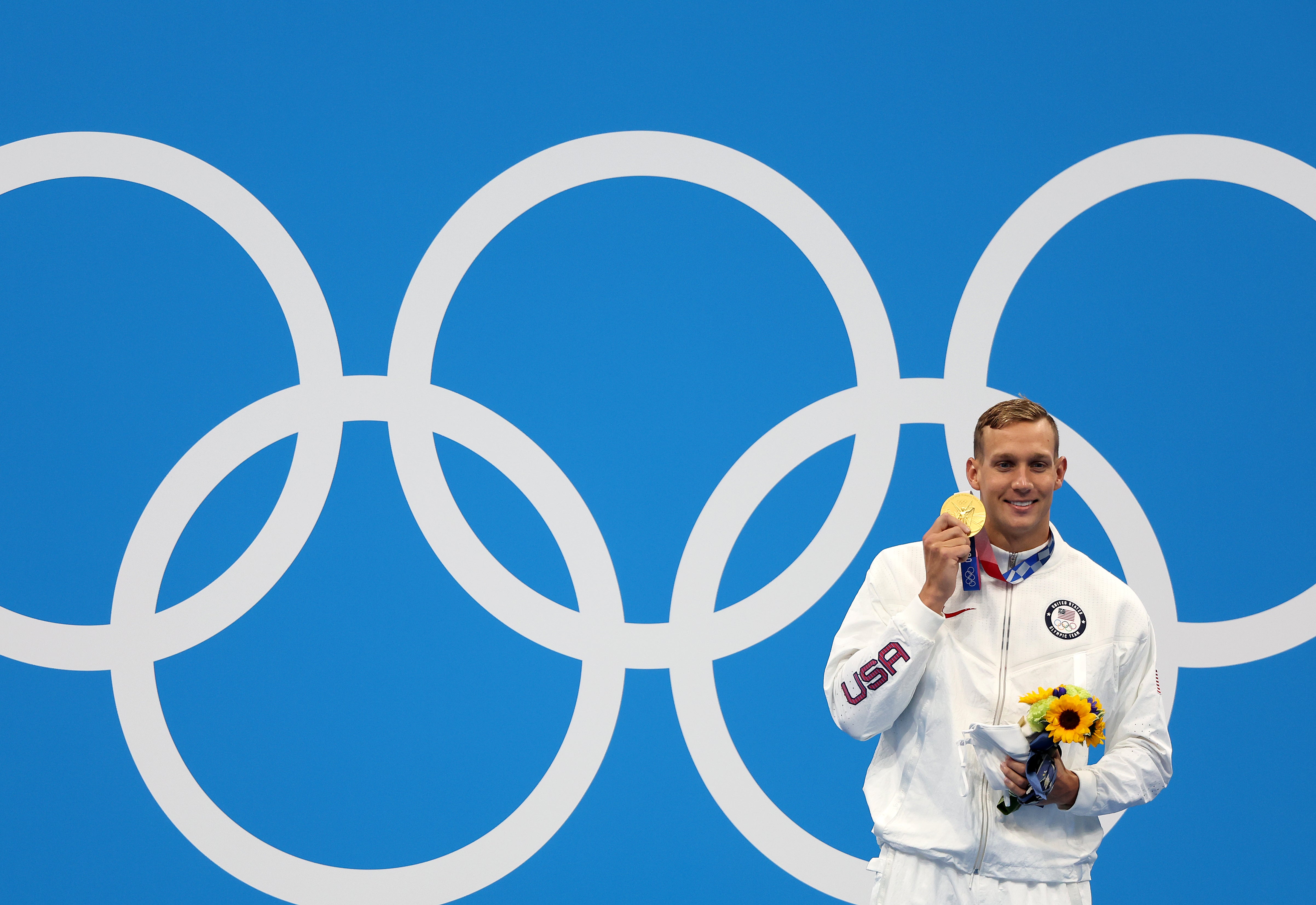Caeleb Dressel is USA’s Olympic swim king with an explosive start and a gentle side
Florida’s 24-year-old Caeleb Dressel has dominated the pool but his emotional reactions chime with an Olympic Games which will be remembered for its most famous athletes opening up to the world

There are some athletes whose presence dominates the pool. There are hundreds of officials, media and noisy teammates at the Aquatics Centre as well as seven rivals, but when Adam Peaty arrives with a towel around his neck, the swimming pool belongs to him. When Katie Ledecky turns up to swim any long-distance freestyle race, there is an unspoken appreciation that this is her stage.
For a few compelling minutes at the beginning of Saturday morning’s session in Tokyo, the Olympic pool belonged to Caeleb Dressel. It doesn’t matter if it’s butterfly or freestyle: the problem with racing the 24-year-old alpha of American swimming is that you’ve lost before you’ve used your arms. An explosive start is his greatest weapon. Everyone else dives; Dressel launches, coiling his giant hamstrings and springing off the block, arching his back with elbows lifted over his shoulder blades like a bird of prey to propel his body through the air, before an immaculate dolphin kick carries him to the surface.
By this point he is invariably winning, and he has won. Dressel is a hard man to catch; on Saturday he held off the field to claim 100m butterfly gold in a world record of 49.45 secs, taking 0.05 off his previous best. In the closing stages he was pushed by Hungary’s very own swimming sensation Kristof Milak, but Milak needed more time to catch up. "It took a world record to win the Olympic final and I don’t think it happens that often in the Olympics," said Dressel, who took time to pay tribute to his rival. "My plan was go out quick and then hold on. I didn’t even die, he just came home really well.”
On Sunday morning he was back in the pool for the final of the fastest event in swimming, freestyle raced over one length of the 50m pool. He won it in 10.
Dressel is fast developing the kind of aura that Ian Thorpe and Michael Phelps exuded. Phelps struggled with his dive technique and it was part of the reason he was more effective over 200m than 100, with time to make up any early deficit. In contrast Dressel is at his best when it’s quick and painless, when he can smother the race before anyone else has come up for breath, and in those events he is gradually picking off Phelps’ world records.
Phelps won 23 gold medals across four Games and Dressel will not match that record feat. He doesn’t have the medley in his armoury, for one thing, nor the range of distances in order to collect eight in one Games, as Phelps famously did in Beijing. But he won two golds in Rio and added four more in Tokyo, and could surpass double figures in Paris in three years’ time.

What stands him out from many dominant personalities of the men’s swimming down the years is his lack of machismo and chest-beating ego, noted by that deliberate appreciation of rival Milak, and a willingness to be vulnerable.
Dressel cried on the podium in Rio after winning relay gold alongside Phelps, who smiled and offered a comforting arm around the shoulder. And there was a beautiful moment in Tokyo this week when he let the tears flow again after winning 100m butterfly gold. He was telling a US TV network it had been “a really tough year” when they connected him to his family, who had been watching his first race on a screen with friends at home in Florida. “Oh my god! Oh my god!” his mum said as her 6ft 3in Olympian son wept. “I love you guys so much,” he managed to say.
Dressel continued to cry as his US teammates applauded him back into their chambers. In an Olympics where America’s poster girl Simone Biles has spoken with frankness about her mental health, it is fitting that the Games’ swim king should show he is an emotional man and a ferocious swimmer, that those two things can exist side by side and that one should never eradicate the other. These are the athletes of 2021; perhaps the lasting legacy of these Games will be that it told the world Olympians are not superhuman after all.
Join our commenting forum
Join thought-provoking conversations, follow other Independent readers and see their replies
Comments
Bookmark popover
Removed from bookmarks